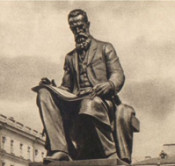
Chronicle of the music life of Rimsky-Korsakov – in the Presidential Library
In anticipation of the celebrated on March 18, 2014 the 170th anniversary of the great Russian composer Nikolai Rimsky-Korsakov, the Presidential Library has prepared a series of unique electronic copies of books not only about an outstanding wizard, but also issued under his authorship.
Rare, known primarily for narrow specialists of the publication of Rimsky-Korsakov "Chronicle of My Musical Life. 1844-1906" and "Musical articles and notes (1869-1907)" are presented. These publications intertwined with biographical data, gradual formation of personality of Rimsky-Korsakov, and the future development of the musical abilities of the great composer.
Nikolai Andreyevich was born in the small town of Tikhvin of the Novgorod province (now the territory of the Leningrad region). The first signs of musical talent became apparent very early in the boy. As Rimsky-Korsakov recalls himself: "Once I was not two years, as I well discern all the tunes that I sang mother; and then three or four years I have excellent toy drum beat in the beat, when father played the piano… I started learning to play the piano when I was six. An old woman, named Ekaterina Unkovskaya, our neighbor started teaching me… I played scale, exercises and some light little pieces".
According to Rimsky-Korsakov, first he did not particularly like music, and all of his free time spent reading books. "But for the sake of the game, exactly the same way as I folded and assorted the watch, I tried sometimes to compose music and write notes", - the author of the "Chronicles" writes.
In life of Rimsky-Korsakov there were a lot of music teachers, but a crucial role in the development of his musical upbringing and education played Fedor Kanille. "Kanille opened my eyes to many things… He was a good pianist; and from him that I first heard the good performance on the piano. When I played with him in 4 hands, even though I played pretty mediocre, though we has success, because he was playing Primo", - recalled Rimsky-Korsakov.
Later Kanille will introduce Rimsky-Korsakov with Miliem Balakirev, who immediately took the talented young man in his circle "Mighty Handful", which had a decisive influence on the formation of his personality and aesthetic views of the composer. In addition to them the circle included César Cui and Modest Mussorgsky. As the author writes in the "Chronicle": "I immediately plunged into some new and unknown world to me, I found myself among these talented musicians, which I only heard before, rotating between amateurs comrades. It was really impressive". Under the influence and guidance of Balakirev was composed the first major work by Rimsky-Korsakov - "First Symphony".
Rimsky-Korsakov, the youngest of the "Mighty Handful", has become the author of the opera "Sadko", "The Tsar's Bride", "The Snow Maiden" and others, realized the need for theoretical foundations of musical creativity, "began gradually to expand the range of his researches and extend into the aesthetics and philosophy. This period of his life has become the period of searching, research and approval pathways of art in general and music in particular", - written in the book "Musical articles and notes. (1869-1907)".
Last fifteen years of his life were not completely covered by Rimsky-Korsakov in the "Chronicles". The Golden Cockerel", staging "Kitezh" at the Mariinsky Theatre and a trip to Paris in the spring of 1907 is nowhere mentioned. "I think this can be explained by the fact that, while N. A. composed "Golden Cockerel", he was, as always, writing absorbed, given to it completely and was no longer able to do anything else. His "Chronicle" was written in between musical compositions", - recalls wife of Rimsky-Korsakov Nadezhda in the preface to the "Chronicle".
The Great Russian composer left a rich artistic heritage, which included fifteen operas, three symphonies, several orchestral works, romances. He also created two collections of Russian folk songs, books and articles on various aspects of musical art.

